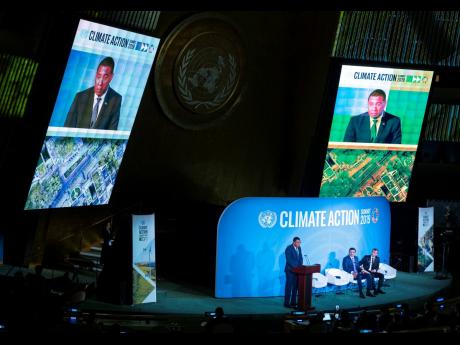Elizabeth Morgan | What the UN summits mean for us
This is summit week at the United Nations (UN) in New York, leading into the 74th Session of the UN General Assembly. More than 150 heads of state and government, including from Jamaica and other Caribbean countries, are expected to participate in five summits on climate action, universal health coverage, sustainable development goals, financing for development, and the midterm review of the Samoa Pathway on sustainable development of small island developing states (SIDS).
All are linked and are reflected in the 17 UN Sustainable Development Goals (UN SDGs), which address, among other things, poverty, hunger, health, education, gender equality, economic growth, climate change, and partnerships for development.
The UN SDGs form the global development plan adopted at the UN Sustainable Development Summit in September 2015 in the resolution, Transforming our World: the 2030 Agenda for Sustainable Development. Jamaica’s National Development Plan, Vision 2030, is aligned to the UN SDGs. I assume this is the same for other CARICOM countries.
The two-day High-Level Political Forum on Sustainable Development (the UN SDGs Summit) is concluding today, September 25. This is the first quadrennial summit, where heads have been reviewing the advances made in implementing the SDGs and determining how to accelerate progress. The summit has been considering two reports – the 2019 Sustainable Development Goals Progress Report and the first Global Sustainable Development Report, titled The Future is Now: Science for Achieving Sustainable Development.
The summit followed the annual UN High-Level Political Forum (HLPF) on sustainable development, held at the ministerial level from July 9-18. This HLPF has responsibility for follow-up and review of progress in implementing the UN 2030 Agenda and its SDGs. Guyana and St Lucia were among the 46 countries that had voluntary implementation reviews. Jamaica and The Bahamas were reviewed last year.
The reports before the summit generally express grave concern about the limited progress, globally, in implementing the SDGs. The link between all the goals requires coherence and coordination for implementation at the level of government, private sector, and civil society. Science and innovation, and the level of consumption, also play critical roles on the negative and positive sides.
Goal 17 – means of implementation
Goal 17 addresses strengthening the means of implementation and revitalising the global partnership for sustainable development through trade and development financing. The 2019 Progress Report reveals that while support for the SDGs is gaining momentum, there are major challenges for developing countries – among them, an overall reduction in overseas development assistance (ODA); greater need for mobilisation and use of domestic resources; remittances becoming the largest source of external finance in low- and middle-income countries; trade tensions adversely affecting producers and consumers; low access to the Internet, a development gateway, and inadequate access to high-quality data for development planning.
Caribbean countries are among those challenged in implementing the UN SDGs. Their high- and middle-income status affects their access to ODA, and high debt levels still limit their fiscal space. Growth levels remain sluggish and export growth is unimpressive. Recently, Hurricane Dorian further demonstrated the vulnerability of Caribbean countries to natural disasters.
The Gleaner‘s editorial of September 12, 2019, titled ‘Jamaica’s Economic Growth Council and GDP trends’, speaking to the country’s continuing anaemic growth rate, states: “ While there has been much development in the finance sector and equities market, investment and innovation in the export sector have not been sufficiently deep and broad to drive faster growth. That is a major challenge that Jamaica must confront urgently.” It is, in fact, a regional challenge.
It will be in our interest to monitor the participation of Caribbean countries in these UN summits, including SDGs, and to see the decisions emerging on the way forward in an uncertain environment for global development partnerships. The Caribbean private sector should be more actively engaged in these deliberations and in implementation.
Elizabeth Morgan is a specialist in international trade policy and international politics. Email feedback to columns@gleanerjm.com and elizabethmorganstliz@gmail.com.

